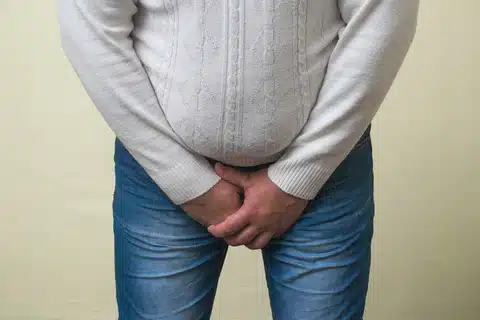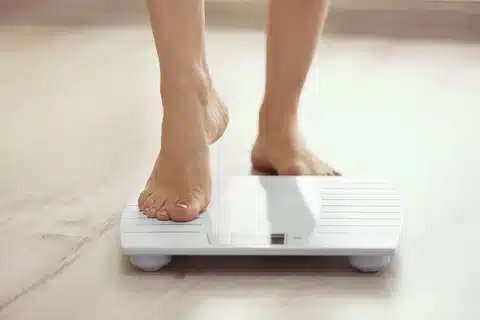We all know that being overweight impacts our health. And while scientists and researchers are still trying to discover exactly what extent it impacts or health, it is generally agreed that obesity contributes to a wide range of medical conditions. These include:
- Type 2 diabetes
- Prediabetes
- Joint problems including arthritis
Being obese can also reduce quality of life. It limits mobility, makes travel difficult and has been found to diminish self-esteem.
However, one of the less known side effects of obesity is incontinence. This occurs when your weight presses on the bladder, causing urinary incontinence. It can also make existing incontinence, worse.
Diet also attributes to bladder control. Join us as we discuss in more detail how your weight can affect or cause incontinence.

How Weight Affects Bladder Control
Researchers have shown a clear association between obesity and urinary incontinence. It shows that obesity is a strong risk factor for urinary incontinence. In fact, for every 5 units increase in weight, the odds of developing incontinence increase by 30-60%.
Further, the same study reveals that there may be a strong association with excess weight and stress incontinence, as well as mixed incontinence with an overactive bladder. However, it shows that women with stronger muscles and better grip strength are less likely to develop or continue experiencing incontinence.
Losing even a small amount of weight can help reduce bladder leakage, including stress incontinence. Stress incontinence is linked not only to pregnancy, childbirth, obesity and menopause, but also with diabetes and prediabetes. Studies have shown that prediabetic patients who lose weight also reduce their chance of developing both diabetes and incontinence.
How Diet Can Affect Bladder Control
While many people who experience bladder leakage attempt to control it by reducing fluid intake, this can actually worsen the problem. It creates highly concentrated urine that makes you need the bathroom – or feel like you need the bathroom – more frequently. Not drinking enough can also create excess bacteria growth, which also leads to bladder infections.
You should also avoid bladder irritants as much as possible. Removing the following irritants from your diet might help improve bladder control and function:
Alcohol
Both a diuretic and stimulant, alcohol increases the amount of urine your produce. It also increases feelings of urgency.
Caffeine
Another diuretic and stimulant. Replacing them with herbal teas (remember to check as some teas also contain caffeine) to improve your symptoms.
Carbonated drinks
Soft drinks and sparkling water make an overactive bladder worse. Choose spring or tap water instead.
Artificial sweeteners
These are known bladder irritants and are terrible for your health. It is best to eliminate them where and when you can.
Chocolate
Another stimulant that can increase the feeling of urgency. Find a replacement for chocolate when you can.
Acidic fruits and juice
Acid can irritate the urinary tract. Citrus fruits, tomatoes, tomato-based products, berries and more all contain acid. Where possible, replace high acid foods with low-acid ones, like banana or avocado. Tomatoes can be replaced by tamarind, capsicum and eggplant.

Drink More Water
This might sound counter-intuitive but staying hydrated is important to reducing incontinence. Water is essential to your digestion, and controls your nutrient absorption, temperature regulation, bowels and other bodily functions. In fact, the best way to avoid triggering urinary incontinence is to drink water steadily through the day. If you are constantly dehydrated, you will find yourself gulping down large quantities of water, which your body can’t process so quickly.
Remember, everyone’s water needs are different. The 8 glasses of water a day rule has, in fact, been long seen as a myth. Further, your water needs are met, not just by water, but by the non-diuretic drinks you have and the food you eat.

How Else Can I Control Bladder Leakage?
There are also additional methods to controlling your incontinence. These include:
Kegel Exercises
The muscles of your pelvis floor and urinary sphincter are integral to urination control. As such, regularly doing Kegel exercises will help strengthen these important muscles. As a result, you have improved control of your urinary incontinence.
Managing Medications
Some medications, like high blood pressure, heart, antihistamines, diuretics, sedatives, antidepressants and others can have incontinence side effects. Do NOT stop any medication without discussing it first with your doctor. They will be able to prescribe a better option for you.
Stop Smoking
Smoking is terrible for your health, so its no surprise that heavy smokers are likely to develop complications. This include chronic coughing which can trigger incontinence.
Constipation
Chronic constipation and straining to use the toilet can damage the pelvic floor. Exercise regularly, drink water and eat a high fibre diet to stay regular.
Exercise
You should aim for at least 30 minutes of exercise a day. This is not only important for your health, it may also reduce incontinence.

Incontinence, Body Fat and Weight
A recent study has suggested that not only your weight, but also body composition, may play a role in incontinence. Stress and urge incontinence were found to be twice as common in patients with the highest BMIs or the greatest proportion of body fat. Further, patients who lost grip strength, which is an indicator of reduced muscle mass, also saw increased episodes of incontinence.
Those who reduced their BMI or body fat by at least 5% were less likely to have persistent incontinence than those who did not lose weight or fat. This suggests that while weight alone may help alleviate both forms of incontinence, it is also important to increase exercise to build muscle mass.
Need help managing incontinence? View our products today!
